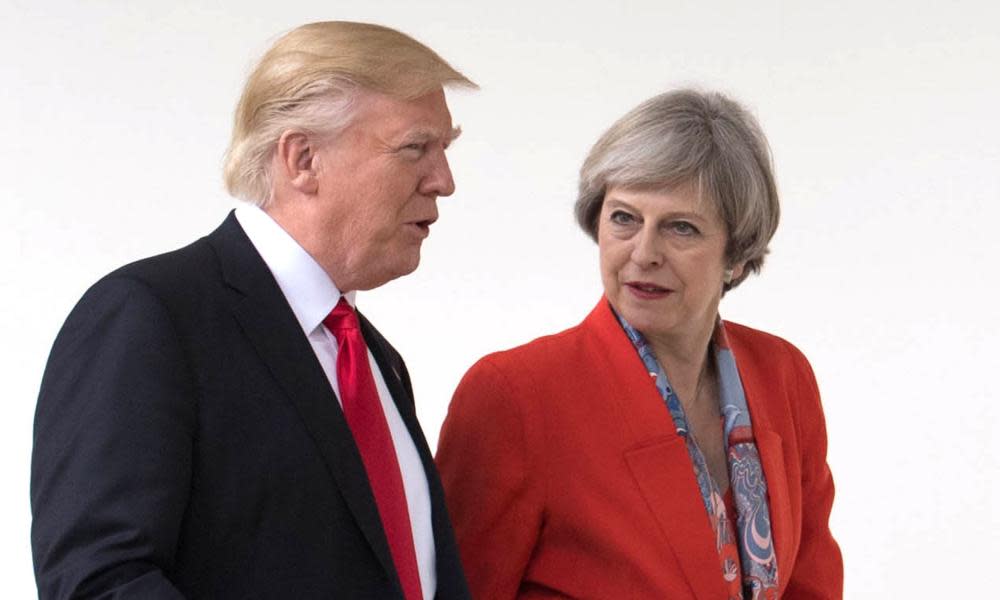May's delay over Trump visit backfires as US-EU divide grows

If Theresa May thought her favoured weapon – delay – would somehow ensure Donald Trump’s visit to the UK next month would be less controversial than if it had occurred last year, she appears to have miscalculated. Six months ago the president was plausibly an unpredictable nationalist constrained by the senior Republicans surrounding him. He had quit the UN’s climate change agreement but otherwise his foreign policy was largely a complaint that America had to pick up Europe’s tab.
The crisis in transatlantic relations was uncomfortable but containable. In May’s cabinet, the foreign secretary, Boris Johnson, held sway, arguing that post-Brexit Britain had to remain close to a country with which it had a natural affinity, and anyway Trump’s re-election could not be discounted. The UK had no option but to ride, and if possible tame, the Trump tiger. The perennial role as America’s ambassador to Europe remained viable.
But in the second year of Trump’s presidency that assessment looks shakier. The adults have left the room and Trump 2.0 presents May with uncomfortable choices she would prefer to avoid.
The two latest episodes – the US withdrawal from the UN human rights council and the sight of child immigrants in cages on the US border – are connected only by timing and the outrage they engender.
The withdrawal from the rights council was long planned, and the US dislike of its perceived anti-Israeli bias is shared by the UK. Aware of the imminent US decision, Johnson travelled to Geneva on Monday to voice his concern to the council directly, not endorsing the US move but showing some sympathy. The predominant UK diplomatic view is that the council, for all its faults, is one of the few institutions where tyrants and authoritarians are held to account. The true beneficiary of a US withdrawal is not Israel but the Gulf kingdoms.
On the issue of the caging of children, May, faced with a direct question in the Commons, had no option but to condemn, even though she knew it would hardly ingratiate her with a president who bears grudges and who finds her cold. Slowly her disagreements with Trump are totting up.
On the Iranian nuclear deal, trade, recognition of Jerusalem as the capital of Israel and even on the climate change deal, the UK chose the side of Brussels rather than Washington. In the words of the Foreign Office permanent secretary, Sir Simon McDonald, “when people might have thought the UK, outside or on the way out of the EU, might have chosen Uncle Sam over Uncle Jean-Claude, we have lined up very solidly with the European side of the Atlantic.”
All these divisions have so far been managed in a low-key way, with the Foreign Office voicing regret rather than anger. But the fear for the UK is that it is not just on policy that Europe and the US are divided, but on respect for what some Europeans most cherish: the liberal world order.
The evidence for that divide mounts up: the “special place in hell” reserved for Canada’s Justin Trudeau, a North Korean dictator afforded a handshake, the tearing up of a bland G7 communique welcoming free trade, and the German chancellor – at a time of maximum political vulnerability – insulted over crime and migration, feeding a narrative dictated by the German extreme right. Even in leaving the human rights council, the US ambassador to the UN, Nikki Hayley, could not restrain herself from lambasting the failure of European leaders to call out the council more in public.
Nor are these policy disputes with Europe being left at the level of rhetoric. Active measures are being taken. US state department officials are dispatched to the capitals of Trump’s selective allies in Europe – Rome, Warsaw and Budapest – to undermine European unity over the Iran nuclear deal, or to Frankfurt to underline to any German bank with US ties that they will face secondary sanctions if they continue to trade in Iran.
Every country lobbies for its own interests, but Trump, in the eyes of Paris and Berlin, seems to be going a step further. Rather than being indifferent to the EU’s survival, he appears to revel in the weakening of mainstream Europe’s leaders. All the alliances, trading relationships and international institutions that have characterised the US-led order for 70 years, including Nato, are now on notice.
That leaves May stranded and UK foreign policy experts in introspective mood. The Foreign Office recognises that outside the EU, the UK as a medium-sized power will need multilateralism more than ever.

 Yahoo News
Yahoo News 
